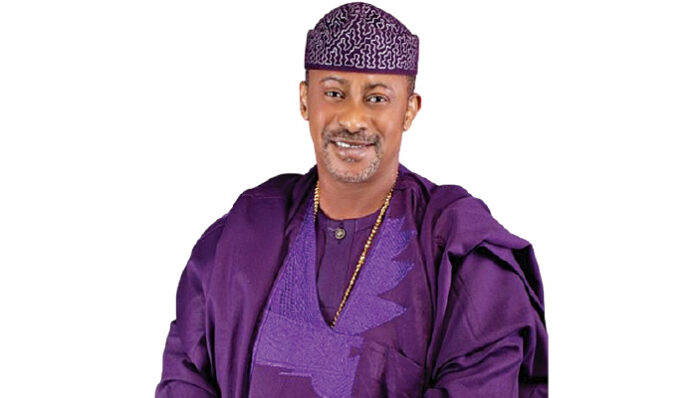Managing Director/Chief Executive Officer of Kingdom & Emirate International Limited and Kajo-Summit Construction Limited, Kamorudeen Danjuma, speaks with FELIX OLOYEDE, on the challenges confronting the real estate sector in the country and strategies for investing in the stock market
Tell us how you came into business.
My father is a successful businessman. During the era of the Doyin Investment, Dosumu, Daily Needs, etc., I was in secondary school when I joined my father’s business. He taught me a lot. That time, he was so strict with me that I doubted if he was my parent. My father would always shout, “Kamoru, call consumers.” He exposed me to business and after my secondary school, I started my own business with a little bench in the front of my father’s shop. So, I made money at a tender age. My parents trained me that I must work hard to achieve success.
You have invested in more than 100 companies on the stock market. What motivated you to invest in equities?
I learnt to invest in stocks from my father. Then, they were buying to keep. They were even framing the certificates then. The pioneer President of the Nigerian Solidarity Shareholders Association, now Noble Shareholder Solidarity Association, Late Akintunde Asalu encouraged me to invest. Then, I don’t think I had shares in up to 10 companies. In one of the Annual General Meetings, I was raising hands that I wanted to talk. After the AGM, Asalu called me and asked for my identity and the companies I had shares He told me he would advise me on the company shares I should buy. I was very knowledgeable in stock trading. So, he taught me stock trading. He told me that you don’t just buy stocks. It is like investing in land. You can buy land in Ikoyi, Banana Island, Magodo, etc., you went ahead to buy land in Okomaiko, etc. It is that money you will use in building there. However, the value of the property cannot be the same.
You can buy some penny shares and make profits. And it is two ways till today. You may invest in some multinationals and make a small or large profit, but you are sure that you will not lose your investment. We invested in Intercontinental Bank, Eko Bank, JaPaul, etc., where are they today? But nobody is fighting for the shareholders. So, Akintunde Asalu taught me the companies to buy, when to buy and when to pull out. You buy when the share price is going down and sell when it is going up. Some people buy when they notice that some companies are about to pay dividends. But sometimes I do not wait for that. I buy a stock for N1m, and when the value gets to N1.2m, I am out. I will keep my profit and invest that money in another company. You do not buy shares to keep or go and sleep. You have to monitor your stocks every day. And you need to diversify your stock portfolios. You need to be abreast of what is happening to the companies. So, you will know when to buy and when to sell.
So, I have invested in more than 100 companies, but it is not all the 100 companies are making profits. Some have a bright future. You don’t invest your working capital. I remember when we bought FirstBank shares for N33 during a public offer about 15 years ago. How much is it today? And we bought MTN about four years ago, we know what MTN is today. So, you must monitor your stocks every day so that you will know when to buy and when to pull out.
I was a member of the Audit Committee of Nestle Foods Plc. I am currently a member of the Audit Committee of Neimeth Pharmaceutical Company and Chairman, Audit Committee of Livestock Feeds Plc. I am also the publicity secretary of the Nigerian Solidarity Shareholders Association and Noble Shareholders Association.
The Exchange made a kill last year, appreciating by over 40 per cent. How do you react to this?
When a new government is sworn in, investors believe it will have new plans. Many foreign investors come to Nigeria because when they bring in their dollars and change them to naira, it becomes a huge sum of money. The Nigerian Stock Exchange is one of the best stock exchanges in the world and if you invest rightly, you will make a profit. Usually, the market is down in January, but this year has been different. The market has been rallying, sustaining the momentum it started in the last quarter of 2023. This is what investors want. In the stock market, in a twinkle of an eye, you can make your money. I remember when Sterling Products was leaving and Beecham acquired it. They did a bonus of 13 for one. It means if you have 1 million shares, they will give you 13 million shares. Those of us who knew about it hoarded our stocks; people were then looking for Sterling Products shares.
Otunba Adebayo, who is now late, usually bought a new Mercedes-Benz from the dividends he collected every year. So, investing in Nigeria is lucrative and I believe the market will perform better this year.
We have seen the trend of multinationals leaving the country. Shell just sold its onshore investment. One of the reasons they are leaving is the harsh business environment. What is your take on this as an investor?
Honestly speaking. We cannot hide behind our fingers. Both multinationals and local companies are not making money. The operating conditions in Nigeria are not conducive for business. Inflation has soared to almost 29 per cent. A lot of companies are still leaving. Nigerian companies are folding up. They need electricity to work. The exchange rate is killing. For instance, you import goods at N1,100/$1 and when you want to fund the letter of credit, they tell you that the dollar is now N1,300. How can you work with that? People are not leaving Nigeria for Ghana to set up businesses. And within a year, they break even. We cannot continue like this. The situation in our country is not good for multinationals to continue to stay. The worsening security situation in the country is not also helping matters. I pray the government will be able to do something so that more companies will not leave the country.
Analysts have predicted that the real estate sector will decline this year. What is your view on this?
Definitely, it will decline, because there is no money to rent or buy property. Go to highbrow areas, there are a lot of vacant houses. Go Magodo, Banana Island and even Abuja, there are many vacant apartments. People cannot afford to rent them. Someone who is earning N200,000 per month is collecting a good salary. But when he fuels his car with N40,000 per week, and pays for TV and internet subscriptions and other expenses, how much will he be left with? Those building studio rooms and one or two bedrooms are the ones making money in real estate currently. How many people can afford to rent a duplex or four-bedrooms currently? They will be telling N6m-N8m. Let’s say a person is earning N500,000 per month, that is N6m per year and he wants to live in a highbrow area. And someone who is collecting N500,000 per month must be a very senior official. How is he going to afford the rent?
What do you think the government can do to provide affordable housing?
The government should reduce import duties on building materials. Just like what they are doing in the pharmaceutical industry, because many people cannot afford drugs. The government should engage builders and developers on how to reduce import duties on building materials, to make housing affordable in the country. And builders must go back to using local materials. There are many companies in Nigeria that can produce high quality building material better than those coming from China and the rest. I know government intervention can reduce the cost of building in the country.
You are a well-known socialite in Lagos. What does it cost to be a socialite?
I went to secondary school with many rich children in Kwara in the 70s. When I was going out with them, my father will say, “Kamoru, you may become a socialite with N200, but N200m cannot sustain you as a socialite.” I am a socialite within and outside Nigeria. I belong to many social clubs, such as the Island Club, Yoruba Tennis Club, Eagle Club, Ikeja Club, etc. And I want to become a member of more big social clubs. I met many of the people in power today through socialising. Many people know the former Governor of Lagos State and former Minister of Works and Housing, Babatunde Fashola. He is my good friend. He is a socialite. My godfather, Senator Ashafa, and others, I got to know them through socialising. The current President, Asiwaju Bola Tinubu is also a socialite. Most of the ministers, commissioners and the current Governor of Lagos State, Babajide Sanwo-Olu, a member of the Island Club, are also socialites.
So, though my father said you become a socialite with N200, but you cannot sustain it with N200m if you cut your coat according to the available material, you won’t have a problem being a socialite. It is never smooth sailing for socialites, but we help each other. Sometimes you see people like General Babagida, Ikewachukwu, Oyinlola, etc., at the Yoruba Tennis Club and you approach them that this is what you want. And they will give it to you. That is the benefit of socialising.
You are into textiles. We have seen most textile firms in the country fold up. What do you think can be done to revive that critical sector?
Over the past five years, I have not been able to do anything in the textile industry. The high exchange rate has badly affected that industry. The worst part of it is that there is no power for textile factories to work. So, the government needs to do something to improve the electricity supply in the country and find a way to reduce import duties on raw materials. If you ask the Manufacturers Association of Nigeria they will be able to tell the challenges facing the industry better. I pray that President Tinubu will be able to do something about it.
You meet some of the people in your social gatherings. Do you tell them some of these challenges?
We tell those who are ready to listen. I listen to criticism, because if I am not criticised, I won’t know where to improve. Many of the people in government today have family members who are not okay. In their family meetings, they tell them what is happening in the country and society. When they go to clubs, members tell them the challenges they are facing.
Most clubs are scanty now because many people cannot afford to go to clubs. They will need to fuel their cars. Imagine living in Magodo and going to Island Club every day. I will have to fuel my car with about N40,000 daily. When I joined these clubs, it was employers who were asking their employees to join clubs, so that could seal businesses there. People no longer go to clubs. People only go to clubs these days once or twice a week.





















